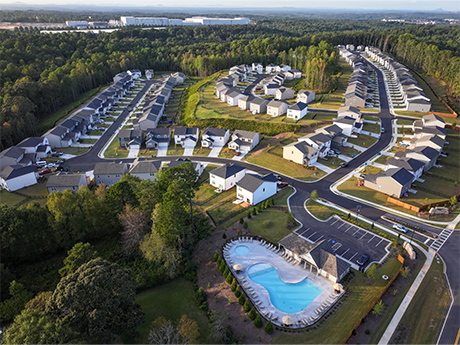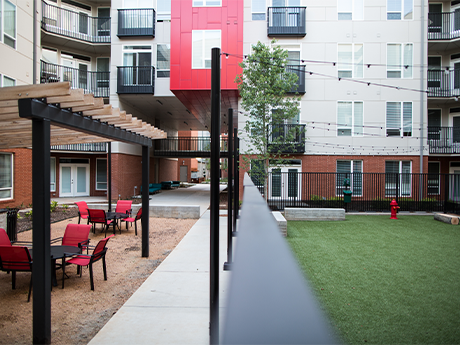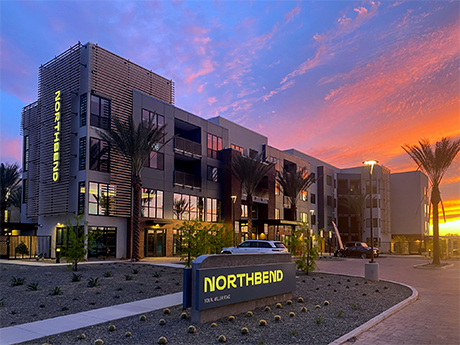In today’s market, rent increases are no longer enough for many multifamily owners and operators to successfully turn a profit at their properties. Ancillary income has always been part of the apartment revenue model. However, to overcome the challenges of increasing labor costs and the elevated cost of living, it has become more essential than ever for property managers to establish revenue streams beyond the monthly rental rate.
“Ancillary income gives property owners a way to cover the costs of services or items provided to residents without raising the rent itself,” explains John DeMario, regional vice president at RKW Residential, a third-party property management firm with headquarters in Charlotte, North Carolina.
“As costs continue to rise, we’ve seen a shift — like with utilities, which are now often charged separately instead of being included in the rent,” DeMario continues. “These ‘other income’ categories allow owners to track how some expenses are being offset and create opportunities to monetize the added benefits of the community.”
Simply put, ancillary income encompasses any revenue a property generates that is not included in the basic rental agreement. This includes a wide variety of services such as renter’s insurance, pest control, pet deposits and pet rent, telecom services and Wi-Fi connectivity.
In addition to establishing additional revenue streams, charging an extra fee for ancillary services can allow property owners and operators to track the return-on-income (ROI) for their investments more easily. Charging separate fees for opt-in services can also give tenants the opportunity to personalize their experience at the community.
Regulatory Attention is Rising
However, the practice has brought the multifamily industry under increased scrutiny over the past year, prompting a new wave of federal and state laws and regulations. Owners and operators must be cautious and thorough to successfully maintain effective streams of ancillary revenue.

In January 2024, a former tenant of a Colorado apartment complex filed a class action lawsuit against Greystar, alleging that the property manager had charged hidden and misleading charges — referred to as “junk fees” — for ancillary services such as valet garbage collection, pest control and billing.
The lawsuit, Collins v. Greystar, was filed in the Denver District Court on behalf of the tenant. She alleges that the junk fees were not included in the advertised monthly rent for her apartment and were hidden from prospective tenants.
“Late disclosure of junk fees is particularly problematic in apartment rental contracts, where tenants may not learn of the fees (or see a copy of their lease) until shortly before move-in, after they have given notice to a prior landlord or invested significant moving expenses,” the lawsuit reads. “In the case of Greystar, rental junk fees operate like a hidden tax on tenants who have no choice but to pay contrived fees if they want to stay in a home or rent a new one.”
Justice for the People Legal Center and Towards Justice are representing the plaintiff. A court date for the case has not been disclosed. Greystar did not reply to Multifamily & Affordable Housing Business’s request for comment on the lawsuit.
Greystar is the largest apartment manager in the United States. According to the National Multifamily Housing Council, the company managed about 798,000 apartment units across the nation as of 2024, including approximately 45,000 units in Colorado. Greystar is based in Charleston, South Carolina, and has more than $45 billion in assets.
Collins v. Greystar is just one of a slew of recent lawsuits that have been raised against the industry on the issue of junk fees. Another case, Lewis v. Greystar California Inc., was filed against Greystar in September 2024, alleging that the property manager charges a junk utility administrative fee each month.
In January 2025, the Federal Trade Commission (FTC) and Colorado Attorney General Phil Weiser filed a lawsuit in Denver federal district court against Greystar. The complaint alleges that Greystar deceptively advertises rental prices without disclosing numerous mandatory fees. Weisner argued that this is a violation the Colorado Consumer Protection Act.
“Because of Greystar’s deceptive advertising and hidden fees, tenants are on the hook in their lease for hundreds, if not thousands, of dollars more than they anticipated that their apartment would cost,” said Weiser in a press release. “Through their actions, Greystar is thwarting apartment hunters from comparison shopping and choosing a home that fits within their budget.”
Greystar issued a statement regarding the suit. “The FTC’s complaint targets a longstanding industrywide practice of advertising base rent to potential residents,” it reads. “The idea that this is done with the goal of hiding fees from consumers is patently false. No resident at a Greystar-managed community pays a fee they have not seen and agreed to in their lease.”
Greystar stated that it is engaged with the FTC to determine how its communities should be advertised. The property manager stated that it is willing to, among other things, display the total monthly leasing price, inclusive of base rent and mandatory fees, whenever possible.
“We are confident that, in time, the courts will recognize this regulatory overreach and rule in our favor,” Greystar concluded. “In the meantime, Greystar will continue doing everything we can to move the industry forward and improve the resident experience in our communities.”
Transparency is Paramount
Another class action suit was filed last October against Essex Management Corp., a California apartment manager. The lawsuit, McAdams v. Essex Management Corp., claims that Essex illegally charges tenants hidden fees on top of charges for rent and utilities.
In late March 2024, the Maryland Supreme Court ruled against Kushner Cos. in a class action lawsuit that alleged the company was charging illegal late fees, in addition to other fees. The suit was filed by five previous tenants of communities that were owned and operated by Westminster Management, an apartment manager that is owned by Kushner Cos.
Last September, the FTC reached a settlement with Invitation Homes, a Dallas-based manager of single-family rental homes. Invitation Homes agreed to pay $48 million to be used to refund consumers for “deceiving renters about lease costs, charging undisclosed junk fees, failing to inspect homes before residents moved in and unfairly withholding tenants’ security deposits when they moved out,” according to a press release from the FTC.
“The multifamily industry has been under intense scrutiny since the start of 2024,” DeMario remarks. “It’s clear that regulatory attention is increasing. While it’s easy to point to rising costs across all sectors — whether it’s airline tickets, eggs or gas — the fact remains that housing is essential. People may be able to cut back on other expenses, but they need a place to live.”

The issue that has arisen in these cases is not necessarily the extra fees charged for the services rendered, but rather the lack of transparency regarding those fees.
To avoid legal trouble, it is critical that property managers be abundantly clear about fee structures from the beginning of the leasing process. As early as possible, prospective residents should be made aware of what they will be charged for and why.
“At RKW Residential, we make it a point to ensure that potential residents are fully aware of all costs before they apply,” DeMario emphasizes.
“Additionally, we take the time to review the lease agreement thoroughly with each renter. We go over all charges and fees to ensure complete understanding, and we ask for their signature to acknowledge they’ve reviewed everything. This proactive approach helps avoid any surprises down the line, ensuring that residents aren’t frustrated months into their lease when they come across fees they didn’t anticipate,” explains DeMario.
“It’s important that community staff are properly trained,” adds Colleen Yeager, chief operating officer at Quinn Residences, a build-to-rent developer based in Atlanta. “The on-site staff at a community needs to be able to speak to these fees and explain what they are and why we charge them. People like to know what they’re paying for in advance, and transparency is key throughout the entire leasing and move-in process.”
Optimal Ways to Boost Revenue
Despite the increased scrutiny, collecting ancillary income has remained an effective way for many property owners and operators to ensure a healthy profit margin. According to a survey from real estate technology company Amenify, about 65 percent of multifamily operators charge fees for extra services such as trash collection, smart home features and parking.
“Ancillary income can make up 10 percent or more of annual income for a property,” explains Dave Brackett, senior vice president of property operations at Milhaus, an Indianapolis-based multifamily developer and owner-operator. “That can make a big difference in terms of your overall returns on any asset.”
“Additionally, separating out the ancillary items can provide a more attractive rent to prospective residents,” Brackett continues. “It can do this by either making an ancillary item optional (meaning that the prospective renter chooses whether he or she wants to pay for it), or by highlighting the value of a particular item that may not be optional.”
Understanding the wants and needs of residents is key to establishing a successful ancillary revenue stream. What are residents currently using? What are they missing? What inconveniences are they encountering? Given the opportunity, what services would they ask for?
Amenify’s survey included 500,000 residents in communities in 561 cities across the nation. When asked to complete the statement, “I would pay for my building to…,” most survey respondents stated that they wanted improved Wi-Fi connectivity. According to Amenify, other common requests included package delivery solutions, work-from-home amenities such as coworking space and help with household tasks such as housekeeping, maintenance and pet care.
One way to generate extra income is to offer residents the option to reserve amenity spaces in exchange for an extra fee. This allows tenants to rent out spaces such as conference rooms and coworking spaces, clubhouses and outdoor spaces such as pool cabanas or pickleball courts. Additionally, property managers can charge a cleaning fee or collect a damage deposit when a tenant reserves an amenity (which can be refunded if it is not needed).
Woodfield Development, a developer based in Charleston, South Carolina, has implemented an amenity fee at its Riverside community in Greenville, South Carolina.

“We added a $35 amenity fee to every new move-in and renewal, which encompasses all the amenity spaces,” explains Leslie Mathis, director of asset management for Woodfield Development. “But it also allows us to provide additional services and items for free. So, if a resident wants to reserve the clubroom or a working pod, there’s no extra charge for that. There’s no cleaning fee. The coffee at the coffee station is free. It’s an easy sell.”
Property owners and operators can also leverage technology as a means of generating extra income. Smart home technology is already popular among tenants. A survey from Rent.com found that 82 percent of renters want at least one smart device or system in their home.
Property managers can monetize this demand by offering smart technology packages as an opt-in monthly subscription. Buildings can also use a similar model to offer services such as Wi-Fi connectivity and utility billing, whether individually or altogether as a bulk technology package.
29th Street Living, the property management division of Chicago-based 29th Street Capital, has had success implementing resident opt-in programs such as rent rewards and credit reporting.
“These programs usually work such that the resident pays the provider directly, and then the provider revenue shares with the operator,” explains Chris Radliff, chief operating officer at 29th Street Living. “These programs offer significant benefits, including a measurable positive financial impact for residents, low onboarding effort and no ongoing maintenance for the team, and revenue sharing with substantial ROI for the property.”
Parking fees are a well-established means of generating ancillary income. Many property managers charge an extra fee for reserved or premium parking, and they will issue a violation fee for tenants who park in the incorrect spot or visitors who overstay the time limit for guest parking.
However, there are additional ways to boost income through parking. For mixed-use communities and properties located in densely populated areas, operators may find that establishing paid public parking hours for nearby retail and commercial space can result in a steady extra stream of revenue. Property managers can also charge an extra fee for services such as electric vehicle charging stations and vehicle rentals.
“It’s like booking a plane ticket,” DeMario concludes. “You’re guaranteed a seat, but there’s an extra cost if you want to sit on the aisle, choose your exit row, or board the plane earlier. Ancillary income similarly offers residents flexibility while helping property owners manage additional expenses.”
— Channing Hamilton


